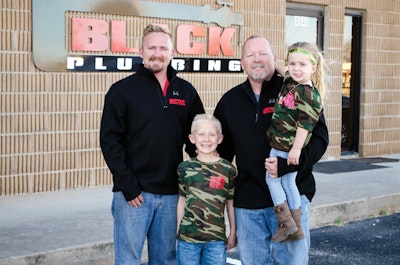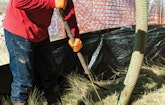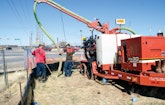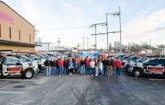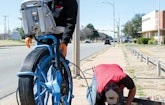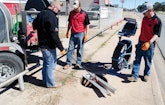
Interested in Inspection?
Get Inspection articles, news and videos right in your inbox! Sign up now.
Inspection + Get AlertsDarrin Black has parlayed his one-man shop into a company with eight locations in West Texas on the strength of one basic operating philosophy: Invest in as many different kinds of equipment as possible.
The way the 51-year-old master plumber sees it, the more kinds of equipment his company owns, the more services he can offer. And the more services he can offer, the more likely it is that he can get a foot in the door with customers. And if he provides great service along the way, those customers will call again when they need something else.
Black had no grandiose plans of becoming a regional player in the plumbing and drain cleaning market when he founded Black Plumbing in Abilene, Texas, in 1994. Since then, the company has evolved from primarily doing drain cleaning and plumbing installations and service work to a well-diversified firm that also does sewer inspections, water jetting, pipe lining, hydroexcavating and pipe bursting.
The approach, combined with a keen eye toward marketing and branding that includes distinctive, camouflage-wrapped service trucks and advertising via billboards, radio and television, has served Black well. As a result, the once-tiny company has now amassed a fleet of equipment — including 25 service trucks, trackhoes, trailer jetters, a CCTV camera truck and various inspection camera systems — that’s worth about $2 million.
“We’re not your normal plumbing and drain cleaning company,” says the plain-spoken Black. “Sure, we do regular jobs every day, but we’re always bringing in more services and more technology — offering more to everybody out there.
“My philosophy is that if you don’t offer that one service that a certain customer might need, you won’t get your foot in the door — they’ll just call someone else,” he continues. “And if you don’t offer all those services, eventually someone else will. So why shouldn’t it be us?”
As a case in point, Black points to a large pipe lining job his company performed at a local U.S. Air Force base, using cured-in-place pipe technology. After the company proved its mettle, about $750,000 in additional work soon followed. “Had we not offered CIPP, we wouldn’t have worked there at all,” he notes. “But once we were on site, it was more convenient for them to let us do the additional work.”
There’s another reason for his multiservice mindset: The bigger the company gets, the more obligation he feels to provide ongoing work for his 56 employees and the families they support.
Or as he puts it, “Once you create this monster, you have to keep feeding it. As a business owner, I have to create opportunities for more and more work for these guys.”
Moreover, there’s a lot of competition in the markets the company serves. Black estimates there’s anywhere from 120 to 150 plumbers in the eight communities where the company has established a shop. As such, Black has always felt the need to establish market niches that differentiate his company from the rest of the pack. Furthermore, he has many employees who embrace new technology, so it’s beneficial to keep those employees engaged and excited.
“Some guys don’t want anything to do with it,” he says. “But there’s a whole group of guys that do. So if they’re willing to invest time and energy in offering those services, then we need to do it.”
Calculated risks
In some instances, Black takes an if-you-buy-it, they-will-come approach in which he invests in new technology even if there’s no immediate need for it. The expectation is that someone will eventually ask for it somewhere down the line. Isn’t that a big gamble? “You’re right about that,” he says. “But it’s a calculated gamble.”
As an example, consider the two customized hot-water jetters Black bought in 2008 from Hot Jet USA for roughly $30,000 apiece. Each unit features a 500-gallon water tank, a 650,000 Btu boiler, 600 feet of 3/8-inch-diameter hose and a water pump made by Giant Industries (3,600 psi at 8 to 10 gpm). Black says it took two to three years before steady demand developed for the two jetters.
“Now we have four hot-water jetters and they all run every single day,” he says. The other two units are PipeHunter jetters from Texas Underground. They feature 500-gallon water tanks and Giant water pumps (3,600 psi at 10 gpm). “We also invested in HammerHead HydraLiner technology (for rehabbing sewer laterals) and it took two or three years before that market kicked off,” he adds. “Now we do pipe lining all the time. It may take two months or it may take two years, but it’s always just a matter of time.”
In addition, Black Plumbing has invested in two small hydroexcavating units made by Ditch Witch. One of the two FX30 models carries an 800-gallon spoils tank and a 300-gallon water tank, and the other features a 500-gallon spoils tank and a 200-gallon water tank. They both use pumps made by Interpump (3,000 psi at 4.2 gpm).
For drain cleaning and plumbing service work, Black Plumbing runs 25 GMC and Chevrolet utility-bed pickups. The drain cleaning trucks carry three RIDGID drain cleaning machines: a K-60, a K-75 and a K-1500. All the trucks carry a pipeline inspection camera; they’re made by RIDGID, Radiodetection and MyTana Manufacturing. In addition, the company relies on eight Kubota trackhoes, two Kubota skid-steers and flat-bed trailers made by PJ Trailers, Big Tex Trailers, Bruton Trailers and Load Trail.
Of course, investing in all that technology is expensive. Affording all that equipment hinged on establishing a great relationship with a local bank. “We have a heck of a banker,” Black says.
“You’ve got to have a good financial backer, no doubt about it. But the size of our company and the revenue it generates allows us to pay cash for things from time to time, too.”
Firefighting meets plumbing
Black took a circuitous route to becoming a full-time plumber and drain cleaner. After graduating from high school in 1984, he worked for a plumbing wholesale house in Abilene. About four years later, he joined the Abilene Fire Department as a full-time professional firefighter. He worked a one-day-on, two-day-off schedule. On his off days, Black did plumbing work, earning a journeyman’s license in 1992 and achieving master plumber status in 1994 — the year he established Black Plumbing.
In 2013, Black retired from firefighting to run Black Plumbing full time. “It got to the point that the plumbing business got too big to manage part time,” he explains. “I was needed more here than they needed me at the fire department.” In 2008, Black’s son, Chris, joined the company. He’s also a master plumber and now runs the company’s service division for the Abilene area.
Growth came via a combination of savvy marketing and branding efforts, providing great customer service and emphasizing quality work instead of lower prices. “Customers keep coming back because for years and years, we’ve kept doing exactly what we say we’re going to do,” he says.
Geographic expansion occurred as Black Plumbing kept traveling farther afield to serve customers, prompting Black to consider branch operations, mostly along the I-20 corridor. In 2010, the company established a location in Sweetwater, 40-some miles west of Abilene. Six months later, Black opened a facility in Snyder, about 30 miles northwest of Sweetwater. From there, additional operations followed in Brownwood, San Angelo, Colorado City, Stephenville, and most recently in Big Springs.
“We took some calculated risks by opening branch locations and trusting guys in those locations,” Black recalls. “Actually, we did everything wrong at first — we didn’t structure it right and didn’t outfit the shops correctly.
“The story easily could’ve gone the other way, but we weathered the storms,” he continues. “We went in and didn’t back down. Business was slow at first because you have to build that reputation.” To establish deeper roots in each community, Black Plumbing sponsors local events and supports local charities. “I feel we’re very blessed to be in these communities that support us, so we need to support them,” he says.
More growth ahead
After being in business more than 20 years, Black says he’s amazed at how his company has grown. “If you would’ve asked me 23 years ago if I wanted 56 employees and 25 trucks, I would’ve told you that you’re nuts,” he says. “I didn’t want all the headaches that come with so much growth. But at the same time, I kept seeing demand for services that kept us growing.”
Black sees more opportunities ahead, in terms of both services and service areas. “I predict more growth. I predict we’ll open up more new locations and maybe get into other parts of our industry that we’re not in now — possibly even the portable restroom business. It’ll happen as long as we dot our i’s and cross our t’s, and keep doing what we’ve been doing.”
There’s one big reason he feels compelled to keep growing: his employees and their 200 or so family members who depend on the company to make a living.
“I’m humbled every day,” he says. “When I graduated from high school, I never figured that this kid was supposed to be some kind of big success story. I figured I’d work for 40 or 50 years and retire — lead a normal life. My aspiration wasn’t to be a business owner with 56 employees. But I love the fact that it worked out that way.”
